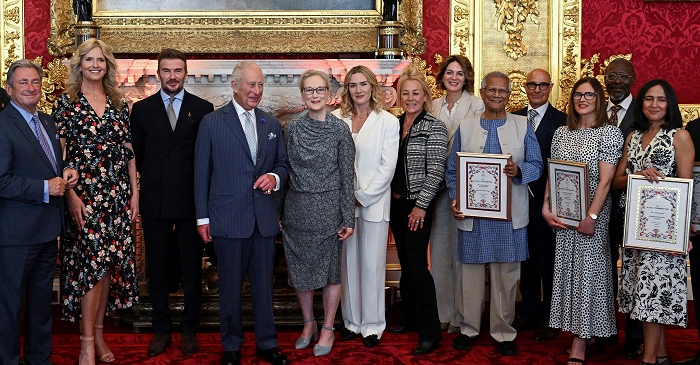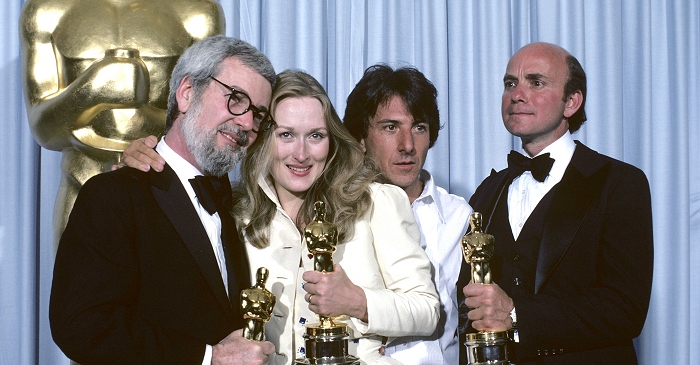|
Simply Streep is your premiere online resource on Meryl Streep's work on film, television and in the theatre - a career that has won her acclaim to be one of the world's greatest living actresses, winning three Academy Awards for "Kramer vs. Kramer", "Sophie's Choice" and "The Iron Lady". Created in 1999, Simply Streep has built an extensive collection over the past 25 years to discover Miss Streep's body of work through thousands of photographs, articles and video clips. Enjoy your stay and check back soon.
|
|
Dual Story Doubles Excellence of Film
Syracuse Post Standard ·
October 31, 1981
· Written by Richard Freedman
|
The year is 1867. Rich, handsome Charles Smithson, an amateur paleontologist and Darwin enthusiast, is in the southern English coastal town of Lyme Regis, searching for fossils in its clay cliffs. Ke is also courting rich, vapid Ernestina when he catches a glimpse of a mysterious, hooded woman standing on a jetty and peering out at the stormy sea. The tragic, searching look she casts at him changes his life forever. The year is 1980. A film is being made of the 1969 John Fowles best seller “The French Lieutenant’s Woman” starring Mike as Charles and Anna as Sarah Woodruff, the title heroine. Mike and Anna are enjoying a casual affair, although he has a wife and child and she has a live-in French lover in London.
These two love stories — the Victorian and the modern — are counterpointed by writer Harold Pinter and director Karel Reisz with such ingenuity, and acted by Jeremy Irons as Mike-Charles and Meryl Streep as Anna-Sarah with such intensity, that “The French Lieutenant’s Woman” emerges as the most engrossing movie of the year. At first the abrupt switches back and forth between the period love story, reminiscent of Roman Polanski’s sumptuous “Tess,” and the modern story-within-a-story are disconcerting. With its deliberate, ironic jolts between past and present — between high romantic passion and cool contemporary sex as fun-and-games — the film could have come out as poor Pirandello or bad Brecht. Yet each story is absorbing in itself, and each comments profoundly on the other. This was the only way to deal honorably and cinematically with a novel in which the author keeps interrupting his Victorian narrative with modern asides about the Victorians themselves. Once Charles has glimpsed Sarah — abandoned 18 months ago by her French naval lover and now working as companion to the despotic Mrs, Poulteney (Patience Collier) — he can give little thought to either his fossils or his fiancee (Lynsey Baxter), He must know more about Sarah, now dubbed the Scarlet Woman of Lyme. But the more he learns, the more mysterious she becomes. Is she’indeed a fallen woman, is she mad, lying, or simply determined to live her own life on her own terms, outside the constricting bounds of Victorian society?
In pursuit of answers to these riddles — and of the beautiful Sarah herself — Charles is blackmailed by his venal servant Sam (Hilton MacRae) and disgraced among his aristocratic peers by a breach of promise action brought by his fiancee’s infuriated father. He spends three years of his life searching for his beloved, who has simply vanished. But in the process he has been transformed from a rather callow, egotistical youth into a man made wise by frustrated passion. In the movie’s splendid symmetry, Charles and Sarah begin as far apart socially as they possibly could, and come together by the end, while Mike and Anna, who play them, begin cozily in bed and end driven apart by their professional and family obligations and Anna’s waning interest in her colleague. The Victorians, the film seems to be saying, ordeied these things better than we do. The very stultifying conventions under which they lived gave a significance to the love of those capable of breaching them that is denied to our own liberated age. Whatever happens to Charles and Sarah – and the film, like the novel, is ambiguous about their ultimate fates — they have experienced something their modern counterparts, Mike and Anna, will never know.
It is impossible to praise too highly the performances of Jeremy Irons in his major film debut (hell be seen later this season in the television adaptation of Evelyn Waugh’s “Brideshead Revisited”) and Meryl Streep in her most demanding role to date. Irons is the perfect young Victorian man-about-town, with just a touch of the cad about him, while Streep ranges easily from an enigmatic Mona Lisa to a tormented woman hovering on the verge of psychotic breakdown. And both actors distinguish subtly between their Victorian and modern characters. Others in the cast, including Leo McKern as the doctor Charles consults about his beloved, Emily Morgan as the servant girl Sam pursues in a light-hearted commentary on the tragic passion of the protagonists, and Lynsey Baxter as Charles’s spoilt, jilted fiancee, are equally fine in this uniformly triumphant movie.










